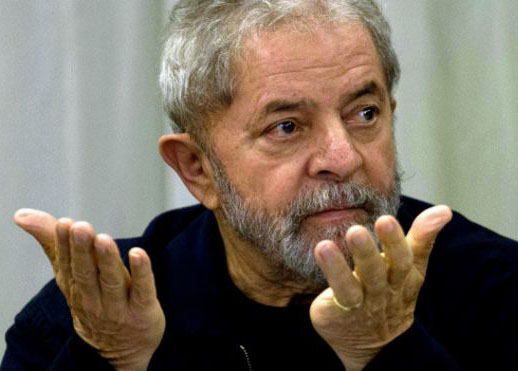SAO PAULO, (Reuters) – Brazil’s former president Luiz Inacio Lula da Silva will stand trial on corruption charges, a crusading federal judge ruled yesterday, adding more turbulence to the country’s political landscape.
Judge Sergio Moro said that Lula, who served as president from 2003-11 and has for two decades been an iconic and powerful political force in Brazil, will face charges of accepting 3.7 million Brazilian reais ($1.14 million) in bribes connected to a sweeping kickback probe at state-run oil company Petrobras .

Moro wrote in his ruling that according to the prosecutors’ charges, Lula was a “direct beneficiary” of bribes from OAS SA , one of the engineering and construction firms at the center of the graft scandal, and therefore must stand trial.
The corruption case will also put on trial Lula’s wife, Marisa Leticia Lula da Silva; OAS Chief Executive Jose Aldemario “Leo” Pinheiro; Paulo Okamotto, the president of the Lula Institute, and four others.
In an emailed note late yesterday, Lula’s lawyers again said their client had committed no crime and said Moro was on a witch hunt to see the former leader jailed.
Lula, speaking via video link, told an event held by his lawyers in New York that the charges were a “farce.”
“What’s happening isn’t getting me down, but just motivates me to go out and talk more,” said Lula, adding that he “will keep fighting.”
Yesterday’s events capped an incredibly choppy few weeks for Brazil.
Lula’s hand-chosen successor Dilma Rousseff was found guilty by the Senate of breaking budget rules and dismissed from the presidency late last month.
Her successor, former vice president Michel Temer, has abruptly pulled the country to the political and economic right, and is trying to boost Brazil out of its worst economic recession since the 1930s.
Moro’s decision may prevent Lula from making a political comeback in the 2018 presidential campaign. It could also derail any hopes the Workers’ Party (PT) had of returning to power, or possibly even surviving, according to some experts.
Despite the corruption allegations facing the PT and several of its former coalition parties, the most recent polls have shown Lula remains a leading candidate for 2018.
Lula was charged with three counts each of corruption, which carries a maximum sentence of 16 years per count, and money laundering, with a possible sentence of up to 10 years per count.
If found guilty, however, the sentence would be determined by the judge, and Lula and the others to stand trial would have chances to appeal.
Nonetheless, simply putting on trial the former president who left office with an 83-percent approval rating sent shockwaves across Brazil.
Lula was widely adored at home and abroad for his exceptional life story, rising from poverty to the presidency, and of being the charismatic, rough-talking former union leader who led massive strikes in the 1980s that helped topple an entrenched military dictatorship.
“It’s a huge, grave blow to Lula’s myth,” said Claudio Couto, professor of political science at the Getulio Vargas Foundation (FGV) university in Sao Paulo. “Any condemnation of Lula would also end up being a condemnation of the Workers Party.”
The decision and the Petrobras probe as a whole make up a watershed moment for the fight against corruption in Brazil, experts say, where for centuries the rich, powerful and politically connected have enjoyed impunity.
Now they are the target of this country’s most sweeping anti-corruption push ever, which became known to the public two years ago. It has since seen nearly 200 people, including top executives and politicians, facing corruption charges and 83 people already found guilty and jailed.
Federal prosecutors leveled charges against Lula last week, labeling him as the “commander” of the Petrobras graft scheme that they say has caused an estimated 42 billion reais ($12.6 billion) in losses to Petrobras shareholders and tax payers.
It was the first time that Lula, 70, has been charged by federal prosecutors for involvement in the political kickbacks scheme at Petrobras.
He has been indicted separately by a court in Brasilia for obstruction of justice in a case related to an attempt to persuade a defendant in the Petrobras scandal not to turn state’s witness.









